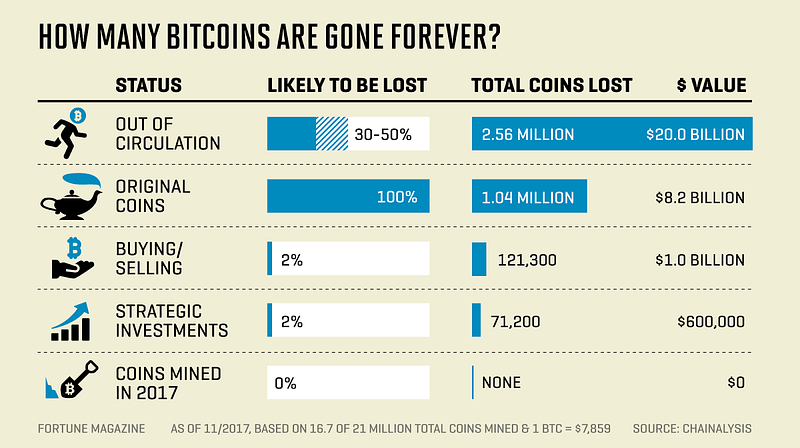
According to Chainalysis, a digital Forensic firm that specializes in blockchain technology, close to 4 million Bitcoins with a valuation of over 30 billion, have been lost forever. They’re inaccessible and outside circulation. How does that happen though?
Currently, there are 21 million bitcoins which can be mined in total, however, the actual amount that can be traded is actually a lot lower. Chainalysis’ estimates say that almost 17% to 23% of the existing bitcoins are irretrievable. With the price of a bitcoin crossing 14.5k dollars, a lot of money is lost.
How are bitcoins lost?
Aa detailed empirical analysis of the blockchain, where all the transactions have been recorded, along with statistical sampling, has helped find an estimated figure of the number of Bitcoins lost. An important clue is uncovered when there is a fork in the blockchain. Such events can lead to the owners of wallets that have been inactive for years to conduct a transaction, providing an opportunity for statistical analysis.
A detailed study can also help know who owns the currency and how it moves around.
Out of Circulation
Most of the lost Bitcoins fall under the ‘out of circulation’ category, which includes the coins mined in its initial founding days when they didn’t exactly carry much importance or worth. Campbell Simpson is one such man who couldn’t foresee the importance of this cryptoasset and now wishes he hadn’t thrown away the hard disk containing the keys to several bitcoins.
Only 4 percent of Bitcoins used for strategic investments and buying/selling have been lost, while none of the coins mined this year have disappeared.
Original Coins
The second-largest number of lost Bitcoins is in the ‘Original Coins’ category.

These belong to Bitcoin’s creator Satoshi Nakamoto. Wallets associated with the supposed inventor, who hasn’t been heard from since 2011, represent 1 million Bitcoins. This translates to a value of anywhere between $15–20 billion, or more, depending on what the value of bitcoin is while you’re reading this.
It is safe to assume that these coins are lost. It’s also worth noting that the findings do make assumptions about some coins being gone forever, hence the inclusion of a low estimate.
The estimate on the remaining bitcoins is based on scraping the Internet for reports of lost coins. It added that the estimate of such losses, which can arise from a misdirected transaction or the loss of a private key through the death or carelessness of a person. It is not based on statistical extrapolation and will be refined further in coming years.
Is this going to go on forever?
While we are aware, going by current trends, that a huge number of bitcoins will be lost in the future as well, the rate at which the bitcoins will become obsolete or disappear, will decrease. Now that the worth and valuation of the Bitcoin has increased, people will be a lot more careful regarding it.
Meanwhile, Bitcoins are also much lesser in number than people actually assume. It is difficult to determine if this is true because it is a highly speculative field. Market cap calculations do not take any lost bitcoins into consideration. However, the exchange behaviour shows how well the market has adapted to supply and demand.
Also Read:
https://blog.unocoin.com/what-challenges-will-bitcoin-have-to-overcome-a88be58973ff



![Fundamental Analysis in Crypto [Updated Guide] A Comprehensive Guide to Asset Valuation.png](https://blog.unocoin.com/wp-content/uploads/2024/11/A-Comprehensive-Guide-to-Asset-Valuation-218x150.png)